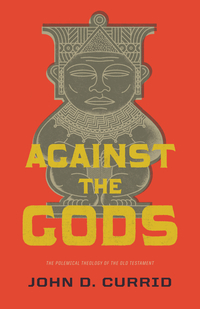John. D. Currid, Against the Gods: The Polemical Theology of the Old Testament, (Wheaton, IL: Crossway, 2013), 160 pages.
I would like to thank Crossway for providing me a review copy.
Overview
 John Currid, professor of Old Testament at Reformed Theological Seminary (Charlotte), writes this book to “demonstrate that the concept of polemics is not foreign to or uncommon in the Old Testament” (p. 10). It is an introduction and is written to those who know little of the subject, but are interested in the relationship between the OT and the literature of the surrounding cultures. Currid’s focus is exclusively on polemical theology, though he notes that this is only one way to look at the relationship between alleged parallels between the OT and literature from the ancient Near East (ANE), which includes Egypt and other Mesopotamian cultures like Babylon and Assyria.
John Currid, professor of Old Testament at Reformed Theological Seminary (Charlotte), writes this book to “demonstrate that the concept of polemics is not foreign to or uncommon in the Old Testament” (p. 10). It is an introduction and is written to those who know little of the subject, but are interested in the relationship between the OT and the literature of the surrounding cultures. Currid’s focus is exclusively on polemical theology, though he notes that this is only one way to look at the relationship between alleged parallels between the OT and literature from the ancient Near East (ANE), which includes Egypt and other Mesopotamian cultures like Babylon and Assyria.
Currid beings with two introductory chapters. The first surveys the history of ANE studies going back to 1798 and up to the present. The second chapter introduces the nature of polemical theology. He defines polemical theology as “the use by biblical writers of the thought forms and stories that were common in ancient Near Eastern culture, while filling them with radically new meaning” (p. 25). Polemical theology can employ shared expressions (e.g., “a strong hand”) or motifs (e.g., the thundering deity).
The next nine chapters examine specific instances of polemical theology. Creation and the Flood receive two chapters (chs. 3–4), and Joseph, one (ch. 5). Stories from the life of Moses receive five chapters (chs. 6–10), and the last chapter is on a collection of Canaanite motifs (ch. 11). These chapters cover the details of the parallel or parallels (sometimes a single biblical story has similarities to multiple ANE stories) in order to establish that a relationship exists between the biblical material and the literature of the ANE. Here, Currid is clear and careful to explain the strengths and weaknesses of each alleged parallel, noting where the biblical text reflects the ANE literature and where it differs. This takes the bulk of each chapter, but he concludes with comments about the polemical nature of the parallel in the biblical material.
The book is small, and there are about 130 pages of content and 11 chapters, so each chapter is on average a brief ten pages. This is a quick and easy read, and one chapter can easily be read when waiting in the doctor’s office, for instance.
Response
Currid notes that the state of ANE studies can be confusing and the nature of parallels to other literature can be complicated. It is not always clear whether conscious borrowing has occurred, and if so, in what direction the borrowing is taking place (see, for instance, chapter 8 on the phrase “I am that/who I am”). Nonetheless, Currid chooses his examples with care and explains them clearly and convincingly. He has made his case that the biblical authors employed “polemical theology.”
 Furthermore, Currid has also made his case that the worldview of the biblical literature is vastly different than the worldview of the cultures and literature from which the biblical authors borrowed. This was no thoughtless syncretism or “crass plagiarism.” It was conscious, subversive, polemical theology that extols Yahweh, the God of the Israelites, as the only true God who has all power and authority in heaven and on earth. All other “gods” are pretenders, unable to do that which their worshipers ascribe to them, while Yahweh does it and more.
Furthermore, Currid has also made his case that the worldview of the biblical literature is vastly different than the worldview of the cultures and literature from which the biblical authors borrowed. This was no thoughtless syncretism or “crass plagiarism.” It was conscious, subversive, polemical theology that extols Yahweh, the God of the Israelites, as the only true God who has all power and authority in heaven and on earth. All other “gods” are pretenders, unable to do that which their worshipers ascribe to them, while Yahweh does it and more.
This is the strength of Currid’s book. It is also a weakness, and one he acknowledges in his preface. After reading this book, the reader might be tempted to conclude that any parallel between the Bible and the ANE should be considered polemics. However, polemics represents only one kind of relationship between the biblical literature and that of the ANE. Polemical theology requires that the biblical author was aware of the specific ANE story or motif and consciously borrowed it for the purpose of subversion. The reader must be careful to remember, then, that the truth is always and necessarily polemical (in one sense) against falsehood. For example, if we belief that a flood actually happened (which we do), and we believe that it happened in the way that the Bible records (which we do), then it is natural to expect surrounding cultures to contain memories of this flood. And their memories may even extend to very fine details (like sending a bird from the ark). However, because their worldview is warped by their own sin and rebellion against God, and because their memories are not preserved from error supernaturally by the Holy Spirit, we would expect their written records to contain kernels of the truth, but bastardized. The work of Satan is to counterfeit the work of God. So stories of a flood that predate the writing of Genesis do not necessarily mean that Moses borrowed (for the purpose of polemics or any other purpose) from these stories when writing Genesis 6–9. It could be that Moses wrote the truth, and the truth will always be polemical against falsehood.
Conclusion
This is a great little introduction the ANE literature and is especially important as the parallels between the Bible and the ANE literature become more widely known. Articles in major news outlets and arguments by popular atheists often draw attention to these parallels for the purpose of denigrating the Bible. Currid has shown one way in which these parallels need not concern faithful Christians, and might, in fact, strengthen our faith and our understanding of our unsurpassable God.
This would be a good book for college students who have an interest in these issues or who struggle with these questions, as well as interested lay-people, pastors, and seminary students. I highly recommend this book.

In the beginning the article has a misspelled word. It says “it beings” when it should say “it begins”